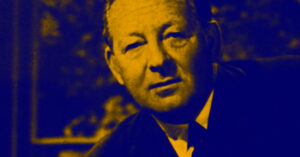News in the Heart of England
Local news for local people

News is one of the most popular programmes on television. It will remain so and will increase its audience even further—just as long as it remains interesting, responsible and authoritative. The job of the News Editor is to ensure that it does.

Midlands News, and its magazine companion, Midland Montage, cover more than 11,000 square miles of the heart of England. It’s an area with fourteen County Councils, fifty main towns and cities, and nearly eight million people.
The organisation of news coverage is a major operation in itself. It involves the co-operation of an enthusiastic staff, and close on one hundred experienced journalists and skilled cameramen all over the region.
The medium itself makes the job of the television News Editor quite different from that of his opposite number on a newspaper.
There is the art of writing the spoken word, and of thinking visually.
In a newspaper the reader can scan the headlines and take his choice. He can ignore the things in which he is not interested and concentrate on that which appeals to him.
Television has much more impact. It can convey news in a way no newspaper can possibly do. It is something real and live, an exciting portrayal which enables viewers to share the experience of those actually involved in the news.
But the viewer is stuck with what we give him. He cannot pick and choose: he can only switch off!
This is just one of the reasons why television has a very special responsibility. People must know that everything they see and hear is fairly and accurately reported, presented without bias and without prejudice.
To take it a bit further, it’s good that there are some things television can’t do. The printed word, for instance, is not always what it appears to be. Sensational statements in quotation marks do not necessarily mean that these were the precise words of the person involved. It’s a sort of journalistic licence to ask a long and involved question, get a simple “yes” and “no”, and then attribute everything to the interviewee.
On television that cannot happen. People are there on the spot to speak for themselves.
A final thought: How would you explain to hundreds of enthusiastic organisers every week that their particular presentation, garden fete, strike, carnival, horse show, sports meeting, Mayor making, amateur dramatic performance, opening ceremony, or outing will look exactly the same on television as everyone else’s — and for that matter, much the same as last year’s and next year’s?

About the author
News Editor



